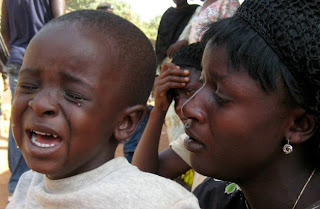
"First the shooting that created panic and then when people scrambled out of their homes, they were slit with machetes. The helpless, the children and the old men, who could not run were slaughtered with no mercy", thus goes the chilling retrospective of the recent spate of violence in Nigeria. The attack happened before dawn on Sunday morning when gangs of men descended on several communities, centred on the village of Dogo-Nahawa, and attacked people with machetes.
Nigeria suffered deadly riots in 2001, 2008 and 2010. This recent slaughter has left more than 200 people dead and many hundreds displaced from their homes and dear ones. A March 9 statement from the Vatican press office emphasizes that although the conflict in northern Nigerian villages pitted Muslims against Christians and it should be seen "not as a religious but a social confrontation." Archbishop John Onaiyekan of Abuja, Nigeria, explained to a Vatican Radio audience that it was "a classic conflict between herdsmen and farmers." The archbishop said that Christian leaders "continue to work to promote good relations between Christians and Muslims."
Nigeria could be a statistician's worst night mare or a resourceful delight. Two-thirds of Nigeria's 130 million people live in abject poverty. Like any other struggling country, Nigeria too has two faces, one of affluence and the other of abject poverty. One in seven Africans live in Nigeria.. One thousand people live in the Olusosun trash dump. A fire there in April destroyed over 300 dwellings. Nigeria is the eighth largest oil producer in the world, and the most productive nation in Africa.
With a legacy of British colonialism, the words of the Archbishop just put the whole situation in perspective. To live in a multicultural and multireligious ambience is adding to the stress levels of all individuals. When every religion tries to wrest dominance from the other, the basic principles of humanity and co-existence are dumped; Nigeria proves that she does not form part of the exception. The recent introduction of Sharia in certain states has opened up the polarity, minorities feel threatened, the majority considers it their right to threaten the minority. The classic confrontation between the settlers and herdsmen is setting the tone for fresh war cries. When religion becomes the convenient and potent weapon in the hands of power crazy political leaders, all hell breaks lose. Reports suggest that over 300 churches have been destroyed in the past three years. Rebuilding churches, even though takes time is within reach, rebuilding the faith, harmony and peaceful co-existence in no piece of cake.
Who can bring back peace to Nigeria? War, slaughter and racial divides can only mash up the beautiful picture of Nigeria. In the bargain, Nigeria will be known only by her violence, which unfortunately is not true. Peace and prosperity is the result of the collective human will as demonstrated by many nations, armed by tolerance and education. Together with all those aching hearts in Nigeria, I too join my cupped hands in prayer for all those who are suffering. Let peace envelope your wonderful country, my lovely good friends, Sheena, Regina, John, Valentine, Paul, Lawrence, Hillary, Solomon and many more whom I do not know by names. "We pray for peace, for good government and for truth. And we pray also that people may realise that the only way to survive in this country is to recognise one another as brothers and citizens of the same nation" Archbishop John Olorunfemi Onaiyekan



